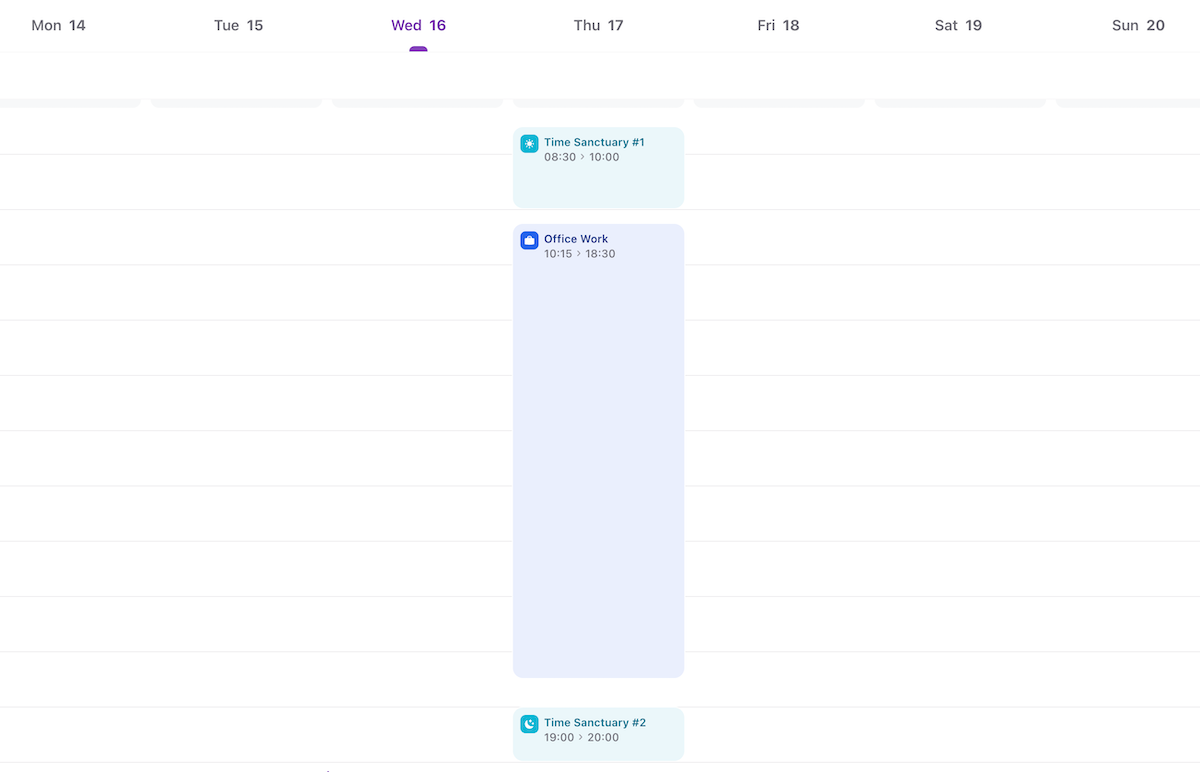Time is one of the most scarce and limited resources we have.
But:
Our impression of time as a resource is quite misleading.
Every day we wake up, we get a fresh batch of 24 hours to live our life.
And the cycle continues, making time seem like an unlimited renewable resource.
I've had plenty of instances where I've passed time out of boredom or wasted time on someone's requests out of politeness or compulsion.
But:
Over the years, that has changed.
In this blog post, I'll talk about three techniques you can leverage to protect your time for the more essential things in life.
Let's start by understanding:
Why protecting your time is important
To understand the gravity of this situation, let's run some calculations:
The average human lifespan is 80 years.
Convert that into weeks, and you have approximately 4,100 weeks.
4,100 weeks to live your best life.
Now:
During the first 7–10 years of our lives, we're too young to understand the value of time.
So, subtracting 10 years from the predicted lifespan, we have 70 years left.
That's 3,650 weeks.
But here's the thing:
It's usually after your mid-20s when you suddenly realise that your time is priceless and you might not have much time left on this planet.
For example:
I was already 28 when I got serious about valuing my time.
And as I'm getting older, this feeling of doing something meaningful with my time is only getting stronger.
At 30 years of age, I have close to 2,600 weeks left on this planet.
But this number is way smaller when calculating your actual productive hours.
Now:
The point here is not to bore you to submission with maths.
It's to pop out this realisation that your time is too valuable to be wasted on meaningless work and the various distractions around you.
Instead, you can reserve your precious weeks for what brings you the most meaning and joy.
But, in this age of hyperconnectivity, meetings and a barrage of ad-hoc incoming requests, how do you make time for yourself?
The answer comes in three layers.
Here's the first:
Create a Time Sanctuary
A significant portion of my waking hours every weekday are run according to someone else agenda.
Being a full-time employee at a firm, I have little control over how I want to design and execute my schedule.
Meetings come in unexpectedly.
A coworker calls to understand some issues they are facing.
And although I could create time blocks on my calendar to indicate that I want to focus, people often schedule meetings on top of those blocks.
So:
I've set up Time Sanctuaries in my work days to find a peaceful time to work on my projects outside office hours.
Wait, time what?
Time Sanctuaries are little chunks of time when I know I'll be protected from external distractions and other obligations.

For example:
I usually have two Time Sanctuaries for working on Hulry.
One in the morning, before the workday chaos begins.
Another in the evening, after the office hours end.
During these time blocks, I have no risk of an unexpected meeting or someone poking me to do something other than what I want to focus on.
I can work on anything I want or spend it however I want.
Like a sanctuary, these blocks protect my time and help me make significant progress on my business.
Visualised on a calendar, the time blocks would look like this:

Now:
You don't necessarily have to work on something other than your office work or do nothing during these time blocks.
If you're constantly interrupted during your working hours and have no focus time left, you can utilise these Time Sanctuaries to get things done at work.
Depending on how free your schedule is and how much time you'd like, you can have one or more such sanctuaries daily.
Here's how to build one:
- Chart out an average workday on a calendar app
- Find gaps in your schedule that you usually have free. For me, it was outside office hours. Yours can be, say, an extended lunchtime or some time else.
- Then designate that time slot for something that you don't get to do during your regular working hours
Start by creating a single Time Sanctuary and then progress to more if you need them.
Now:
Once you have your Time Sanctuaries created, the next step is to:
Learn to say no
Although time blocks create opportunities to zone into a flow and get things done, they're not a silver bullet.
With the newfound time blocks in your day, it gets tempting to say yes to most, if not all, incoming requests since you can very well accommodate them.
But:
A crucial skill to learn here is to turn down appealing opportunities or humble requests if they don't add value to your life.
It would feel awkward or impolite to turn down requests from a close friend or an important prospect, but you must develop a thick skin.
You don't have unlimited time.
If you say yes to everything that makes your way, you'll soon be devoid of any time to do the things you really want to do.
Here's how I do it:
Whenever I get a request to work on a new project or do freelance work, or even some chore, I think:
Do I want to swap my hours on Hulry or family time for this?
The answer is often no.
Unless it's an unavoidable chore or an irresistible offer that would ultimately add value to my life.
And here's how I politely turn down an offer:
Thanks, but I can't do this right now. I'll reach out if anything changes.
Usually, people understand and respect the decision.
For ones that don't, well, there's nothing I can do.
You can use the same framework to turn down requests you don't want to cater to.
Find activities or work you want to do in your free time.
And then use that as an anchor in your decision when a request for your time rolls in.
Ask yourself:
Would you rather spend your productive hours catering to an ad-hoc request than doing work or an activity that's more important to you?
Sometimes, the answer would be yes, and that's fine.
Life's too random, and it's unwise to assume that you can follow a perfectly crafted routine every time.
And it's okay to deviate from your set route to attend something that might work out for your best.
The thing is, you'll get better at identifying this fine line and turning down unyielding proposals.
Pieter Levels, maker of multiple online businesses, takes this concept of saying no to a new level by completely blocking out external requests.
You don't have to go that far, but it's beneficial to be somewhat inaccessible to people who are always trying to demand your time.
Now:
There would be situations where you had said yes to something because it seemed exciting or valuable at the time, but you don't feel like doing it anymore.
In these situations, you have to:
Uncommit after you've already committed
It's okay to change your mind about a task you had previously committed to, or some offer you couldn't turn down.
For example:
A few years ago, a friend invited me to work on an online tutorial for his learning platform.
At the time, the offer seemed exciting and could help me gain more exposure in the software development community.
So, I said yes.
However:
After a few weeks, I realised that creating video tutorials is a time-consuming affair.
Time that I didn't have because I was already tied to other priorities.
Realising this, I reached out to that person and turned down his proposal with an explanation.
He was happy that I got back to him upfront and respected my decision.
I could get out of that commitment without turning the relationship sour.
And to this date, I'm glad I didn't waste too much time on that activity because I could leverage that time and focus on my projects.
So:
Even if you had previously committed to something, you could realign with your goals and turn these commitments down as early as possible.
People understand that you're busy, and there's a high chance they wouldn't mind.
But here's the thing:
Don't get out of commitments or be a no-show at the very end.
Be respectful of your and others' time and notify them early on.
The last thing you want is to be deemed unreliable.
Now:
You've learnt strategies that'll help you make time for yourself, dodge unwelcoming invitations, and reclaim some of your lost time.
But, for any of these techniques to work, you need:
A shift in your mindset
Society has conditioned us to view money as precious and limited and time as something which is okay to give away freely.
But, in reality, the inverse is true.
You can earn all the money in the world. But you can't create time.
So:
Starting now, treat your hours as gold blocks in the bank:

Now, if one hour of your time was equivalent to one gold block, would you casually give it away?
When you attach a monetary or tangible value to time, you become more cautious about how you spend it.
Do this:
Observe how you spend your time in the coming week.
Notice which tasks or activities you spent significant time on that could've been avoided.
Then, think about what you want to make more time for.
It can be working on your business, spending more time with your family, enjoying some hobby or anything that feels worth it.
With knowledge of your current schedule and how you want it to look, use the strategies we discussed to craft your ideal plan.
Make more time for things you want to do by eliminating things you don't.
Use your 4,000 weeks wisely.
Liked this blog post? You'll love the weekly newsletter:



 In-depth articles, series and guides
In-depth articles, series and guides
